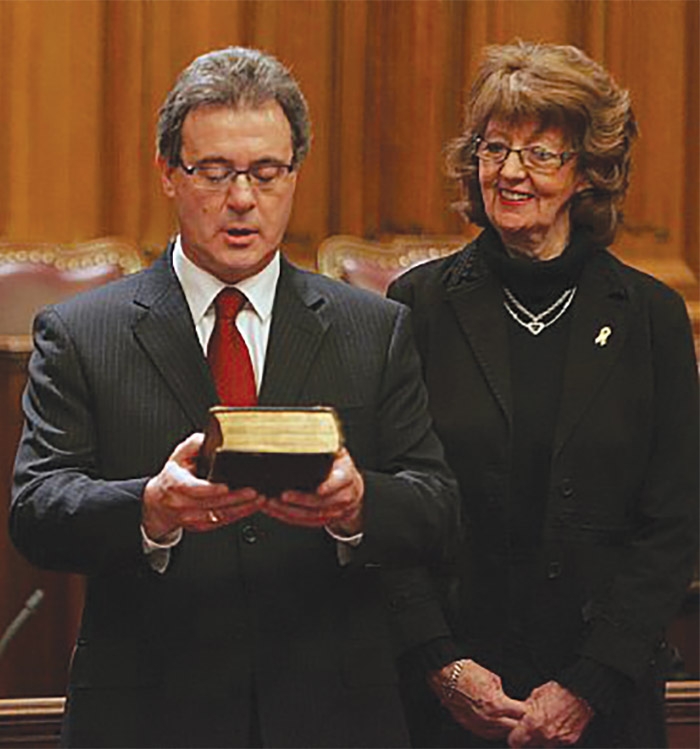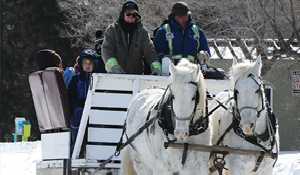Senator Michael MacDonald on the Bill C-69 hearings
March 28, 2019, 6:57 am
Kevin Weedmark


Senator Michael MacDonald is the vice-chair of the Senate Energy, Environment and Natural Resources Committee, which is reviewing Bill C-69.
He spoke with World-Spectator editor Kevin Weedmark last week about the hearings into Bill C-69. Opponents say Bill C-69 would stop any future pipeline projects and are hoping the Senate can play a role in amending the bill. The conversation was an hour long and would fill this entire newspaper, but here are the important parts:
Is your committee coming out to Western Canada and is there a schedule set for that?
There was some question if we would travel, but the committee approved travel by a vote of 14 members to zero. The committee will be travelling to the west the second week of April. We’re going to go to Vancouver, spend a couple days in Alberta and Saskatchewan and in Manitoba.
Do you know exactly where you’ll be holding hearings in Western Canada?
We know roughly. Vancouver, Calgary, probably Fort McMurray or Edmonton, but probably Fort McMurray, probably Saskatoon and Winnipeg. One of the issues is—and I hope you appreciate this—there is so much interest in the bill and we’re just inundated with requests from municipalities and mayors and different organizations so there are a lot of requests and not enough speaking spots. We’re setting some rules in place and determining who we’re going to listen to and who we’re not.
How do you determine that? How do you decide this person is worth listening to, this person is not?
Well first of all what we did, it’s not a matter worth of people listening to as much as who’s best informed for what study. Who’s got skin in the game. I think these things are important. It has to be a mixture of who the energy, the natural resource committee needs to hear from. People with an environmental perspective of things will be at the table, so will the First Nations people, and especially people who are involved in the industries, who have knowledge and experience we can learn from. We want to get a good cross section of people who bring as much relevant evidence to the committee as they possibly can. There are all kinds of people who feel emotion about these things. A hundred billion dollars worth of investment flooding out of this country for the past three or four years is a problem and people have to come to grips with the fact that it is a problem not just in Western Canada. The entire country has to come to grips with the fact that it’s a huge challenge.
The Moosomin committee working on Energy East is putting together a submission and would like to present to the committee in person if possible. Any advice for them?
We have dozens of communities that are asking for hearings. We have dozens of provincial and municipal politicians asking for hearings.
We will try to hear as good a cross section of opinion as we can.
We’ll try to accommodate a broad spectrum of representation.
When it comes to what you’ve told me about Moosomin’s experience with Energy East and the oil sector, I want you to know you have my full sympathy and empathy. This is happening in many communities across the country. I’m a person who has flown back and forth between Ottawa and Nova Scotia for decades.
I see oil patch workers on the plane every flight coming back home spend three weeks out west making good money, buy the big F150, a nice new house and a swimming pool, doing well, working hard away from the family for long stretches of time when times are good in the oil patch.
But it isn’t just people in Western Canada who are affected. I just want people to know as much as we appreciate how much this downturn is hurting Saskatchewan and Alberta it’s hurting us all down here too.
We’re losing jobs and we appreciate what effect it’s having in Western Canada. I want Albertans and the people of Saskatchewan to realize how much all kinds of Canadians appreciate how much they contribute to the country in terms of revenues and wealth from their natural resources, and they deserved to be listened to.
What are you hoping will be accomplished through these hearings?
I’m hoping we get some really good amendments that can strengthen the bill. I’m hoping to convince Canadians that they should really look hard at what this bill is proposing to do and what its impact might be on the economy of the country and the growth of the economy and our ability to create wealth and compete. I also want to hopefully open the government’s eyes up to some of the excesses in this bill.
I think education and information is key. The public has to understand. I think there is always going to be a hard core of people that don’t want to hear what the truth is or will ignore it, but there is also a certain percentage of people that say ‘oh, I didn’t know that’ or ‘that’s good to know,’ so I think these people have to realize that this is actually a national pan-Canadian issue. It’s not just a Western Canadian issue, although the impact is felt the most there in certain industries.
Is there a realistic hope for some substantial amendments in the Senate to Bill C-69?
I think there is a realistic hope for substantial amendments to C-69 in the Senate. Is there a realistic hope that the government will accept them? That is a different story.
The government is giving us indications that they’re open to the amendments, but they’re going to say that anyway. They made a few amendments that came out of the House of Commons Committee, but the House of Commons Committee don’t seem to have given the bill the thorough going-over that we are giving it and are going to give it, so I suspect we’re going to have more amendments.
I think there will be dozens and dozens of amendments. I don’t know exactly because we have to listen to the witness list and we’re going to be going across the country and hearing from a large list of witnesses in Ottawa, so I think we wait and listen to the people who are most knowledgable on the impact.
How would you describe the level of interest in C-69 compared to some of the other bills that the Senate has had input on?
The interest is growing. I’d suggest it is growing as people are becoming more aware that there is a real problem when it comes to the oil industry in this country. The resource industries are hurting, so people are becoming a little bit more conscious of that, and so Bill C-69 is something that is starting to get some focus. This will help focus those people on this. The government said they have changed all the timelines and things are going to be more efficient, but the truth is there is nothing to stop activists from coming in and intervening, and they can shut down things forever. There’s also an enormous amount of arbitrary power given to the minister. There is a reason.
Reading Bill C-69, it sounds like regardless of the hearings and determinations, final authority will rest with the cabinet.
That was always true to a certain extent, but in practice in this country if it went through all the proper channels, if the National Energy Board approved it then the government approved it. The National Energy Board was a well respected body and actually a model around the world. Now, in Bill C-69, the people who are in charge of giving the green light do their due diligence over a period of years and give it a green light, and the cabinet can just overrule it.
There is a reason why you have an expert panel in place. They have years of experience in managing and regulating large mineral or oil and natural resource production, they have a track record. Why wouldn’t you lean on them? I just find that the decision making power is far too arbitrary and they just ignore all the work that has been done.
Given the amount of interest in this issue, why is the tour limited to a week in Western Canada?
We’re going east for a week and west for a week. Senate committees rarely go on trips in regards to bills, but this bill was so important that we thought it had to be done, so if anything, the fact that we’re going to go on tour to meet with Canadians to hear their response to this bill and their feedback and their input is not limiting it but opening it up. I believe that is actually an indication of how important this bill has become. If you look at the way the senate works, this is rare.
What sort of time line is the senate on in regard to C-69?
We’re hoping to have the bill back between May 9 or 15 into the Senate. We travel for a week and then two weeks later we go to the east coast. We go to St. John’s, Halifax and Quebec City.
So late April we’ll finish the cross country stuff. We’ll probably finish two weeks later, report it back to the house with some amendments to the bill that can be debated, discussed and voted on at the senate, and then once amended it has to go back to the house and then they have to accept some or all, or reject all the amendments.
Do you think that having the tour, getting out and meeting with Canadians will affect some committee members’ views of the bill?
I think the fact that the committee voted to go out and meet the country on this bill, I think that is an indication that the majority of committee members think and expect there are going to be amendments and desire amendments. So I think that is true already to some extent, and hopefully a lot of good information comes out at the hearings.



































